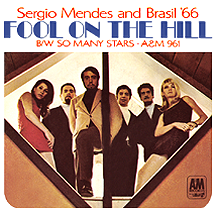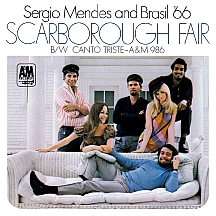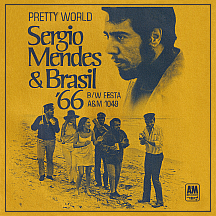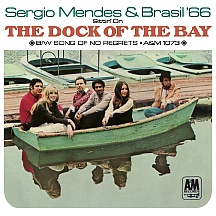SERGIO MENDES
AND BRASIL '66
The location was right, and even moreso the timing, to launch a successful lifetime career in music. Sergio Mendes spent his formative years of the 1950s surrounded by a vibrant Latin music scene rooted in the samba's African rhythms as interpreted and modified to suit the tastes of the Brazilian people. Studying classical piano as a teenager in his hometown, Niterói, and its Conservatory of Music, just a few miles across Guanabara Bay from the lavish beaches of Copacabana and Ipanema, placed him in the epicenter of the bossa nova movement, a refined blend of those earlier influences. When, in 1964, millions of people turned their attention to this place where he'd been born (a result of Getz/Gilberto's "The Girl From Ipanema," a worldwide hit closely aligned with the bossa nova), 23-year-old Mendes, already several years into his own career in jazz, relocated to Southern California, where he was perfectly placed to advance to the forefront of Latin music superstars. All he needed was to develop an approach that would set him apart. Being partial to female vocalists, he preferred the sound of two girl singers as opposed to a solo act or larger group. Once this concept was realized with Brasil '66, the fabulously talented Lani Hall its focal point, everything fell into place.
As his piano skills improved, his interest shifted to jazz; listening to the great saxophonist Charlie Parker, he became fixated on Bud Powell, Parker's intrepid pianist who took a vigorous approach to playing, using unconventional chord patterns and minor keys at odds with most jazz compositions but well-suited to bebop stylings. Mendes, barely in his mid-teens, began merging this musical mindset with the rhythmic patterns of his homeland. At age 19, in 1960, he tested his improvisational ideas as a performer at the Bottles Bar (part of "Bottle Alley" or, in Portuguese, Beco das Garrafas) at Copacabana Beach, crossing paths with pianist Antonio Carlos Jobim and guitarist João Gilberto, key figures in the emerging bossa nova scene. Americans Dizzy Gillespie, Quincy Jones and Stan Getz came to the Bottles Bar at different times to soak in the scene, usually ending up sitting in on jam sessions at the club.
By 1962 he'd formed the Bossa Rio Sextet with Durval Ferreira on guitar, Paulo Moura on alto sax, Octavio Bailly Jr. on bass, drummer Dom Um Romão and trumpeter Pedro Paulo, playing each night to packed crowds. With Durval, Mendes made Dance Moderno for the Brazilian Philips label. Then the entire group contributed two tracks to flutist Herbie Mann's Do the Bossa Nova album, recorded entirely in Rio de Janeiro. When the band toured the U.S. later in the year, they joined "Cannonball" Adderley for a Riverside Records session, Cannonball's Bossa Nova. In 1963, the Sextet put together one more album for Philips: Você Ainda Não Ouviu Nada! (You haven't heard anything yet!), issued in America as The Beat of Brazil on Atlantic Records.
In April 1964 the Brazilian government was overthrown, replaced by a dictatorship that remained for many years. Mendes saw this as a possible threat to his ability to continue working as a musician; he moved to the U.S. in the fall and settled in Los Angeles, recording The Swinger From Rio with a different group of musicians including Jobim. Then for Capitol he put together a new group, The Sergio Mendes Trio, with bassist Sebastião Neto and drummer Chico Batera. The album Brasil '65 featured guitarist Rosinha de Valença and vocalist Wanda de Sah (who you might say served as a prototype for what was to come). This group, with the addition of percussionist Paulinho Magalhães, gave an excellent live performance at a club in San Francisco, released on Atlantic as In Person at El Matador. A single, "Reza," was taken from the LP. Jazz historian Leonard Feather made this comment about the music in the album's liner notes: "May it continue to manifest its intriguing characteristics in Brasil '66, Brasil '67 and so forth far into the Pan-American future." He'd inadvertently made reference to a not-yet-realized trend in the naming of Mendes's future endeavors.
Another hint at Sergio's future came in the form of a non-LP single in early '66, a bossa nova rendition of The Beatles' "All My Loving" with a male/female chorus. His splendid experience at El Matador led him to the all-important decision about female frontwomen. In 1965, he'd seen Lani Hall sing in a club in Chicago. Some months later he contacted her with an offer to join his band. Lani, who was 19, had to get permission from her parents and, fortunately, they complied. When Herb Alpert caught the act, he became determined to sign them to his label, A&M. Ahmet Ertegun of Atlantic, for whom Mendes had just recorded The Great Arrival, fought to keep him but withdrew when he realized how enthusiastic Alpert was about his new find; Ahmet knew Mendes would be better off in L.A. with A&M than on the Atlantic side.
The first single by Sergio Mendes and Brasil '66 came in the summer of that year. "Mas Que Nada," penned by Rio favorite Jorge Ben, burst forth with an infectious rhythm, coupled with Hall's enticing vocal, that transcended its lyrics; many record buyers didn't know or care what it meant (a playful expression that translates as "more than nothing"). It was, by most accounts, the first song in the Portuguese language to become a hit in America, fueling sales that made Herb Alpert Presents Sergio Mendes & Brasil '66 a million seller.
The latest and greatest lineup included second female vocalist Bibi Vogel, bass player Bob Mathews, percussionist José Soares and drummer João Palma; all the men except Palma contributed background vocals, Sergio included. The sound evolved as time went by, as organ, woodwinds and strings gave many of the songs a dreamy essence while retaining the basic feel of the bossa nova. Equinox, another gold album, featured three hit singles: "Constant Rain (Chove Chuva)" (another Ben song, this one with English lyrics by Norman Gimbel), "For Me" and Cole Porter's "Night and Day," each embedding Lani's cool, sensuous voice a little further into mid-'60s pop culture. Bibi Vogel, on the other hand, forfeited her second-banana status to pursue an acting career. She was replaced by Janis Hansen.
Atlantic Records, meanwhile, had released a single from the earlier album (a remake of The Mamas and the Papas' "Monday, Monday"). Sergio then recorded Sergio Mendes' Favorite Things for Atlantic as a "solo" act (backed by seasoned jazz musicians) to satisfy the terms of his previous contract. Alpert had no problems with this, as the set was more of a jazz effort (like his earlier albums) and bore no trace of the "Brasil '66" sound. An instrumental version of the Bacharach-David hit "Say a Little Prayer" (made famous by Dionne Warwick) briefly appeared on the charts in early '68.
The next album, Look Around, featured a Burt Bacharach-Hal David song that became the band's "viral" moment (not a word that usually applies to the music of the '60s, but in this case it's an absolute fit). For reasons only guessed at, Dusty Springfield didn't perform her hit "The Look of Love" on the televised Academy Awards ceremony in April 1968. Brasil '66 took over, the broadcast was seen by hundreds of millions of viewers around the world, and reaction in the U.S. was instant and overwhelming; most people not yet familiar with Sergio, Lani and the band certainly knew who they were afterwards. Their take on "Look" quickly climbed the charts and was a top five hit by the middle of June.

"Fool on the Hill": another Beatles cover, another top ten hit, another gold album for A&M and owner/fan Alpert. Plus a Grammy nomination for Best Pop Performance by a Duo or Group. This effort marked some changes in the lineup once again, most noticeably a new second vocalist; Karen Philipp came on as a replacement for Janis Hansen. Late in the year, Mendes and company secured their third consecutive top 20 hit with a jazzy, string-drenched interpretation of Paul Simon's "Scarborough Fair." 1969 brought "Pretty World" (one of the group's best, a top ten Easy Listening hit) and the Otis Redding hit "Sittin' on the Dock of the Bay," both from the album Crystal Illusions. The routine of doing Latin-tinged remakes had largely run its course by 1970; Lani left the group during the sessions for Stillness and was replaced on a few tracks by Sergio's wife, Gracinha Leporace, who had occasionally sung with Brasil '66. Hall set about launching a career as a solo artist.
As early as 1971, Mendes changed the act's "dated" name to Sergio Mendes and Brasil '77, keeping it for the remainer of what became his first outing with A&M and throughout a brief stint in 1973 with Bell Records; "Love Music" was their best-known song during this phase and the vocalists were Gracinha and Bonnie Bowden. While Lani Hall had little success as a solo act, she made one good move: she and Herb Alpert were married that year and have remained happily wed ever since. Sergio began a longer stint with Elektra in 1975, billed as a solo act with many interchangeable musicians and lead female duos (always)! In 1979 he resumed the gimmick, going with Sergio Mendes and Brasil '88, but only kept it through the end of his Elektra contract the following year.
Sergio went home in 1982. Not to Brazil, but back to the former Charlie Chaplin movie lot where A&M's studios had been located since he'd joined the label in '66. Who would've figured...he had the biggest hit of his career in the spring of 1983 with the non-Latin-style "Never Gonna Let You Go," a "power ballad" (and one of pop music's all-time most intricately-structured, key-shifting hit songs) featuring vocals by Joe Pizzulo and Leza Miller. He became a mainstay of Adult Contemporary radio for the next few years and reached the pop top 30 again in '84 with "Alibis," also featuring Pizzulo's lead. He even gave the name Sergio Mendes and Brasil '86 a whirl, even after Brasil '88 had floundered, though for the first time in two decades he got the year right!
In 1992, he won a long-awaited Grammy award on just the second attempt: Brasileiro triumphed in the category Best World Music Album. Reconfiguring the group again (still with two female singers) as Sergio Mendes and Brasil '99, he switched it again to Brasil 2000 before ditching the numbers game. A highlight of his 21st century career came when he received an Oscar nomination for the song "Real in Rio" (cowritten with Carlinhos Brown and Siedah Garrett) from the 2011 animated film Rio. Though he hadn't lived in Brazil for more than half a century, Mendes proudly based his professional journey on the music he grew up with on the western shores of South America, relishing the process of combining Portuguese with English and bossa nova rhythms with jazz. He continues to tour internationally; there's a strong chance Sergio Mendes will be performing (with two women singing onstage) somewhere near you in the near future.
NOTABLE SINGLES:
- Reza - 1965
by Sergio Mendes - All My Loving - 1966
- Mas Que Nada - 1966
- Day Tripper - 1966
- Constant Rain (Chove Chuva) - 1967
- For Me - 1967
- Night and Day - 1967
- The Frog - 1967
- Monday, Monday - 1967
by Sergio Mendes - Say a Little Prayer - 1968
by Sergio Mendes - With a Little Help From My Friends - 1968
- My Favorite Things - 1968
- The Look of Love - 1968
- The Fool on the Hill - 1968
- Scarborough Fair - 1968
- Pretty World - 1969
- Sittin' on the Dock of the Bay - 1969
- Wichita Lineman - 1969
- Norwegian Wood - 1970
- For What it's Worth - 1970
- Chelsea Morning - 1970
- Righteous Life - 1971
by Sergio Mendes - Love Music - 1973
as Sergio Mendes and Brasil '77 - The Real Thing - 1976
by Sergio Mendes - I'll Tell You - 1979
as Sergio Mendes and Brasil '88 - Never Gonna Let You Go - 1983
by Sergio Mendes with Joe Pizzulo and Leza Miller - Rainbow's End - 1983
by Sergio Mendes - Alibis - 1984
by Sergio Mendes - Take This Love - 1986
as Sergio Mendes and Brasil '86





